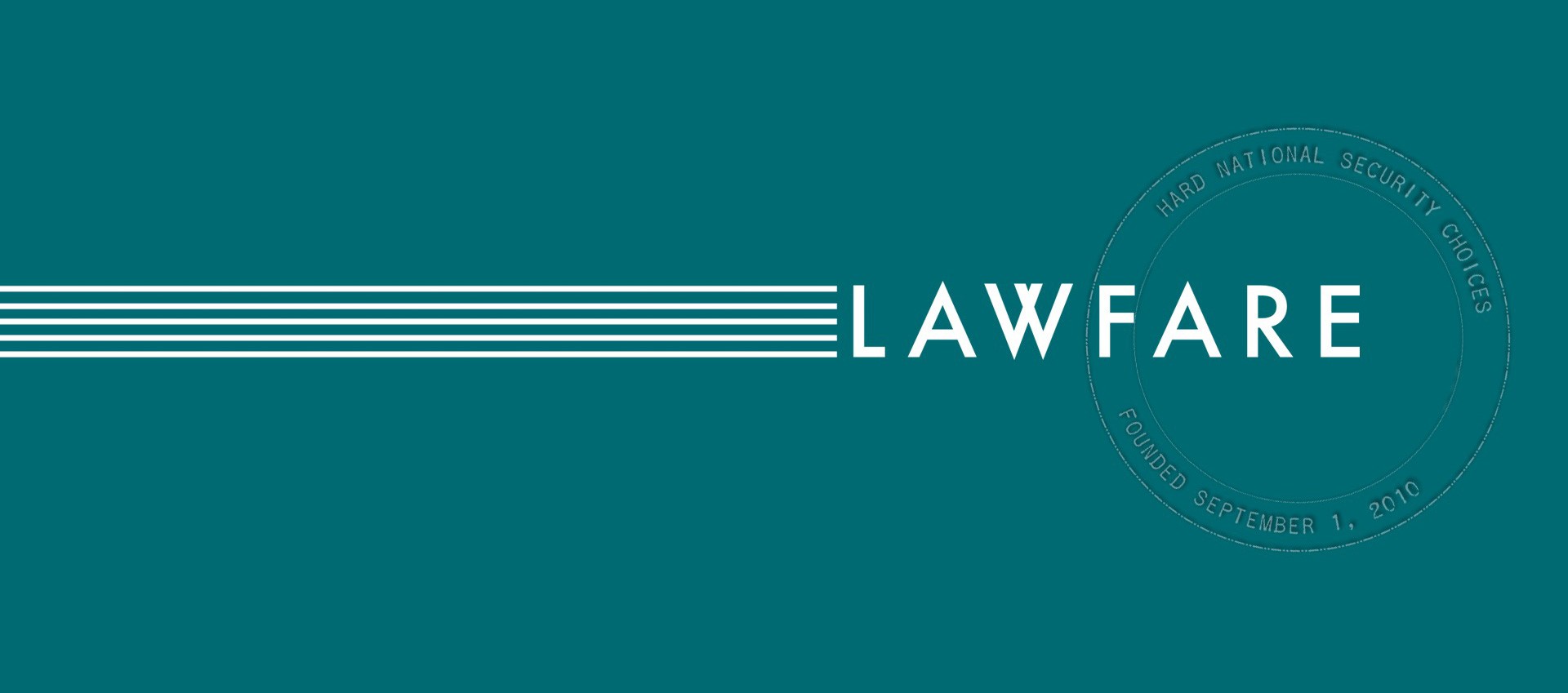The Week That Was: All of Lawfare in One Post
Your weekly summary of everything on the site.

Published by The Lawfare Institute
in Cooperation With

European Union’s approval of a major overhaul of its immigration laws. They discussed the EU Pact’s new provisions, why critics are calling them a violation of human rights law, how asylum and migration law is evolving globally, and more:
Chimène Keitner analyzed the International Court of Justice’s March 28 order specifying additional humanitarian measures for Israel to comply with amid the looming famine and “deteriorating humanitarian conditions” in Gaza.
Michel Paradis reviewed “Judgment at Tokyo: World War II on Trial and the Making of Modern Asia,” by Gary Bass. Paradis was compelled by Bass’s re-telling of the Tokyo Tribunals because of his characterizations of the justices and contribution to the broader postwar debate, but found that Bass omits details that would have provided greater context to the picture he paints.
Also on the Lawfare Podcast, Benjamin Wittes sat down with Paul Beckett to talk about the detention of Wall Street Journal’s Russia correspondent Evan Gershkovich, following the one-year anniversary of his arrest. They discussed what is known about Russia’s charges against the young reporter, what the U.S. government is doing to secure his release, and more:
Antti Ruokonen discussed how the shortage of 155 mm artillery shells is exacerbating Ukraine’s urgent need for military assistance in its war against Russia.
In this week’s installment of Lawfare’s Foreign Policy Essay series, Matthew Evangelista argued that once Russia’s war of aggression comes to an end, Ukraine is better off adopting a conventional military strategy of defense as opposed to nuclear deterrence through NATO.
On the Lawfare Podcast, Orpett sat down with Anne Meeker, the author of a new report from the POPVOX Foundation that focuses on the little-known congressional effort of congressional staffers helping Afghan allies flee the country during the U.S. withdrawal from Afghanistan. They talked about what staffers did to help, the challenges they faced, and more:
On Chatter, David Priess spoke with Elizabeth Saunders about her new book “The Insiders’ Game,” about the influence that foreign policy elites have on presidents and public opinion. They discussed her path to studying foreign policy, the ups and downs of archival research, the meaning of foreign policy "elites," the differences between the influences of Democratic and Republican elites, and more:
On Rational Security, Alan Z. Rozenshtein and Quinta Jurecic were joined by Orpett to talk through the week's big national security news, including the gag order expanded by Justice Juan Merchan against former President Donald Trump after he posted pictures and articles about Merchan’s daughter online, the two Israeli strikes that killed high-level Iranian military officials in Syria and several aid workers in a World Central Kitchen convoy in Gaza, the looming disinformation mess on X as the 2024 electoral season approaches, and more:
On the Lawfare Podcast, Wittes sat down with Anna Bower, Tyler McBrien, Katherine Pompilio, Roger Parloff and Jurecic to talk about the Monday hearing in New York where Merchan ordered a new trial start date of April 15, the Thursday motions hearing in Fulton County, and more:
On April 4, Wittes sat down with Parloff and Bower for this week’s episode of “Lawfare Live: Trump’s Trials and Tribulations.” If you could not attend the live event, the recording is available on Lawfare’s YouTube channel or over the weekend on the Lawfare Podcast feed:
Jurecic examined a California bar court’s recommendation for the disbarment of John Eastman, one of the lawyers behind the “fake electors scheme”to overturn the results of the 2020 election. Jurecic discussed the implications of the recommendation in the ongoing search for accountability—three years after the Jan. 6 insurrection.
Matt Gluck considered the shortcomings of Special Counsel Robert Hur’s report on President Joe Biden’s handling of classified material following the release of a transcript of Hur’s five-hour interview with the president.
Bob Bauer argued, in response to Jack Goldsmith, that there is still value in the institution of the special counsel, which can be improved by reforming its rules, regulations, and scope of its role.
Tobin Raju and Catherine Chen unpacked how Section 241 can still protect the right to vote while addressing concerns of First Amendment rights in the case of United States v. Mackey—for which oral argument was heard today before the U.S. Court of Appeals for the Second Circuit.
Rozenshtein explained why model weights for artificial intelligence do not constitute speech protected by the First Amendment. Rozenshtein unpacked the cases that established that source code could be protected under the First Amendment in particular circumstances, and argued that model weights do not enjoy these same protections because they “function solely as machine-readable instructions.”
On the Lawfare Podcast, Justin Sherman sat down with Benjamin Wiseman to talk about the Federal Trade Commission’s (FTC) recent data, privacy, and AI cases such as its proposed settlement with Avast Antivirus and its lawsuit against data broker Kochava. They discussed the FTC’s recent focus on health, location, and kids’ privacy, its ongoing data privacy and security rulemaking, and more:
On another episode of the Lawfare Podcast, Eugenia Lostri spoke to Jim Dempsey and Ece Kamar about what meaningful contestability in government AI systems looks like in practice and their recommendations that could help governments embrace AI while enabling the contestability required by law. They talked about the challenges that the use of AI creates for contestability, how their recommendations align with recently published OMB guidelines, and more:
Matthew Kugler found, through surveying Americans on their privacy expectations and comfort levels of government use of facial recognition, that the public has different levels of concerns regarding its use. He explained that respondents felt more comfortable when facial recognition was used for law enforcement purposes as opposed to non-law enforcement purposes.
In the latest edition of the Seriously Risky Business cybersecurity newsletter, Tom Uren discussed the Cyber Safety Review Board’s report on Microsoft’s recent intrusion in which a cyber group linked to China compromised the emails of U.S. and U.K. officials.
Linda Greenhouse reviewed “The Court at War: FDR, His Justices, and the World They Made,” by Cliff Sloan. Greenhouse praised Sloan’s ability to “stitch together” a relevant and composite portrait of the Supreme Court during the Second World War to demonstrate the influence of former President Franklin D. Roosevelt on the justices.
On April 3, Lawfare announced another auction item on the Givebutter campaign— the “Black Hole of Awful” Post-It by Jurecic, one-of-a-kind Lawfare sketch born from a conversation with Wittes that illustrates the extent to which trial delay is advantageous to Trump. Other items of exclusive Lawfare merchandise up for auction include an autographed Lawfare jigsaw puzzle and Wittes’s Twitter sensation and protector of democracy #BabyCannon. Place your bids to support Lawfare’s Trump Trials coverage. You can also support Lawfare’s Trump Trials coverage by making a contribution here.
And on March 14, Lawfare launched a new page where you can find all of our coverage of the New York criminal trial against Trump relating to alleged hush money payments made during and after the 2016 election.
And that was the week that was.

